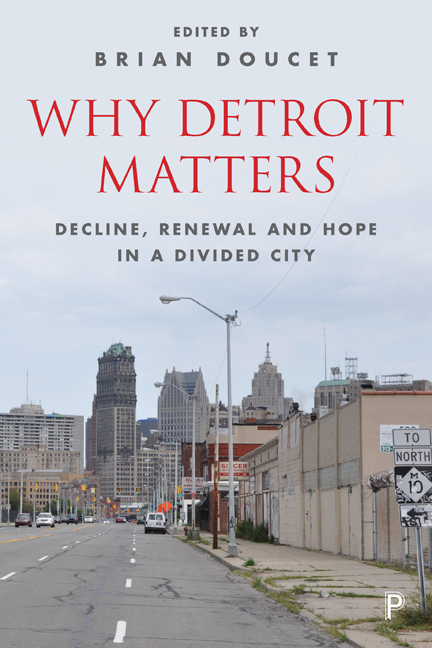Book contents
- Frontmatter
- Contents
- List of contributors
- List of figures and tables
- Acknowledgments
- one Introduction: why Detroit matters
- Section One Lessons from Detroit
- Intermezzo I You may not know my Detroit
- Section Two Practices from Detroit
- Intermezzo II My Detroit
- Section Three Conversations from Detroit
- References
- Index
eighteen - Detroit Black Community Food Security Network
Published online by Cambridge University Press: 05 April 2022
- Frontmatter
- Contents
- List of contributors
- List of figures and tables
- Acknowledgments
- one Introduction: why Detroit matters
- Section One Lessons from Detroit
- Intermezzo I You may not know my Detroit
- Section Two Practices from Detroit
- Intermezzo II My Detroit
- Section Three Conversations from Detroit
- References
- Index
Summary
The next five conversations all revolve around the topic of food. We start with Malik Yakini from the Detroit Black Community Food Security Network (DBCFSN). The organization was formed in 2006 in order to address food insecurity among Detroit's African-American community and to organize members of that community to play a more active role in local food security and food sovereignty.
The primary location for growing food is the D-Town Farm, a seven-acre site in Rouge Park. D-Town is one of the largest urban agriculture sites in Detroit. Funded through the Kellogg Foundation, they are involved in both the production and selling of food in the City of Detroit, as well as working to educate local communities and visitors to Detroit.
Malik Yakini serves as the executive director of the DBCFSN. He has been an activist for more than 40 years and has lived in the same house on the west side of Detroit since the 1960s. He was politicized and radicalized as a teenager and came of age during a very volatile time period in Detroit, characterized by protests and walkouts at the schools he was attending. His adult life has been dedicated to uplifting the community that he is a part of. For more information, see: http://detroitblackfoodsecurity.org or www.d-townfarm.com
Can you explain the concept of food security and why it's such an important issue in Detroit?
Food security is generally understood as being a condition that exists when all the members of a community have adequate amounts of culturally appropriate food. When we started the DBCFSN, we were familiar with the term food security. But as our awareness of that term grew, we realized that what we were actually looking at was food sovereignty, more so than food security because food security only speaks to people having adequate amounts of food. As one of my teachers and comrades, Raj Patel, says, “you can have food security in prison.” So we are really struggling for something much broader than that, which is control of the systems that provide our food. This includes how that food is grown and transported, and justice with how that food is accessed.
- Type
- Chapter
- Information
- Why Detroit MattersDecline, Renewal and Hope in a Divided City, pp. 289 - 296Publisher: Bristol University PressPrint publication year: 2017



